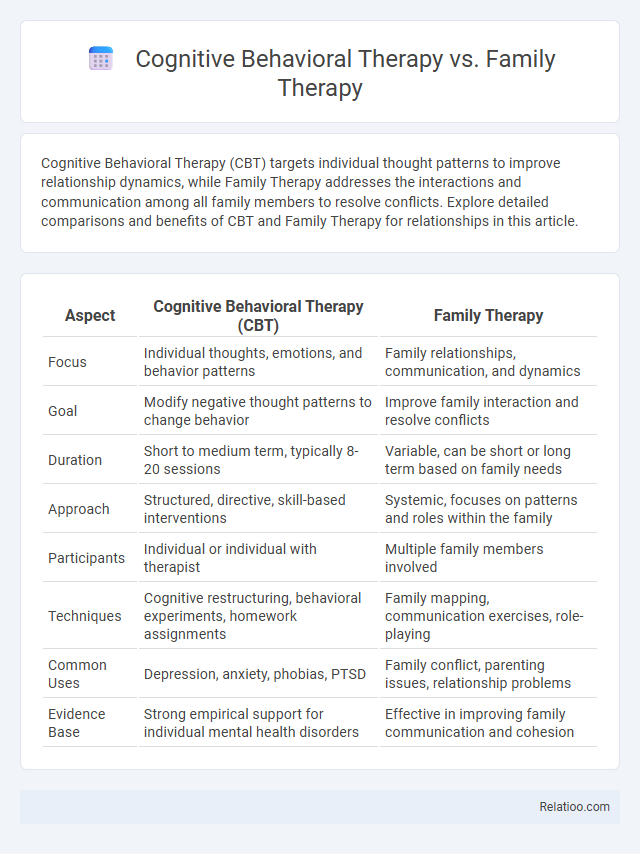Cognitive Behavioral Therapy (CBT) targets individual thought patterns to improve relationship dynamics, while Family Therapy addresses the interactions and communication among all family members to resolve conflicts. Explore detailed comparisons and benefits of CBT and Family Therapy for relationships in this article.
Table of Comparison
| Aspect | Cognitive Behavioral Therapy (CBT) | Family Therapy |
|---|---|---|
| Focus | Individual thoughts, emotions, and behavior patterns | Family relationships, communication, and dynamics |
| Goal | Modify negative thought patterns to change behavior | Improve family interaction and resolve conflicts |
| Duration | Short to medium term, typically 8-20 sessions | Variable, can be short or long term based on family needs |
| Approach | Structured, directive, skill-based interventions | Systemic, focuses on patterns and roles within the family |
| Participants | Individual or individual with therapist | Multiple family members involved |
| Techniques | Cognitive restructuring, behavioral experiments, homework assignments | Family mapping, communication exercises, role-playing |
| Common Uses | Depression, anxiety, phobias, PTSD | Family conflict, parenting issues, relationship problems |
| Evidence Base | Strong empirical support for individual mental health disorders | Effective in improving family communication and cohesion |
Introduction to Cognitive Behavioral Therapy (CBT) and Family Therapy
Cognitive Behavioral Therapy (CBT) targets individual thought patterns to alleviate symptoms of anxiety, depression, and other mental health disorders by developing practical coping strategies. Family Therapy involves multiple family members to improve communication, resolve conflicts, and strengthen relationships within the family unit. Choosing the right approach depends on Your specific needs and whether the focus is on individual behavior change or enhancing family dynamics.
Core Principles of Cognitive Behavioral Therapy
Cognitive Behavioral Therapy (CBT) centers on identifying and changing negative thought patterns and behaviors through structured techniques like cognitive restructuring and behavioral activation. Unlike Family Therapy, which focuses on relational dynamics and communication within family systems, CBT emphasizes individual cognitive processes and skill development to manage specific mental health conditions. Core principles of CBT include the interplay between thoughts, emotions, and behaviors, goal-oriented treatment, and evidence-based interventions to promote lasting psychological change.
Key Concepts in Family Therapy
Family Therapy centers on improving communication patterns, resolving conflicts, and strengthening emotional bonds within the family system, emphasizing roles, boundaries, and family dynamics. Cognitive Behavioral Therapy (CBT) targets individual thought patterns and behaviors to alleviate psychological distress but does not explicitly address systemic family interactions. Key concepts in Family Therapy include systemic perspective, genograms, and the identification of dysfunctional interaction patterns, making it unique in addressing relational issues beyond individual cognition.
Differences in Therapeutic Approaches
Cognitive Behavioral Therapy (CBT) focuses on identifying and changing negative thought patterns and behaviors through structured, goal-oriented sessions that emphasize individual cognitive restructuring. Family Therapy centers on improving communication and resolving conflicts within family dynamics by addressing relational patterns and fostering collective problem-solving among members. Understanding these differences helps you select the most appropriate therapeutic approach based on whether individual thought processes or family interactions are the primary focus of treatment.
Goals of CBT vs Family Therapy
Cognitive Behavioral Therapy (CBT) primarily aims to identify and modify negative thought patterns and behaviors to improve an individual's emotional regulation and coping skills. Family Therapy focuses on enhancing communication, resolving conflicts, and strengthening relationships within the family unit. Your choice between CBT and Family Therapy should align with whether your goal is personal cognitive change or collective family dynamics improvement.
Typical Techniques Used in Each Modality
Cognitive Behavioral Therapy (CBT) primarily employs techniques such as cognitive restructuring, behavioral activation, and exposure therapy to address individual thought patterns and behaviors. Family Therapy utilizes interventions like structural mapping, communication exercises, and systemic reframing to improve interaction dynamics and resolve relational conflicts within the family unit. Both modalities emphasize skill-building but differ with CBT focusing on individual cognition and behavior while Family Therapy targets relational patterns and family system functioning.
Suitable Conditions for CBT and Family Therapy
Cognitive Behavioral Therapy (CBT) is highly effective for individuals experiencing anxiety, depression, PTSD, and other mood disorders by targeting negative thought patterns and behaviors. Family Therapy is suitable for addressing relational conflicts, communication issues, and systemic problems within family units, fostering healthier dynamics and mutual understanding. Your choice between CBT and Family Therapy should depend on whether the focus is on individual cognitive restructuring or improving family interactions and relationships.
Family Involvement in Both Therapies
Family involvement plays a crucial role in both Cognitive Behavioral Therapy (CBT) and Family Therapy, but it manifests differently. In Family Therapy, the entire family system is engaged to address relational dynamics and communication patterns, directly involving family members in sessions to promote collective healing and problem-solving. Your active participation in CBT may include family members to support behavior changes and reinforce coping strategies, yet the primary focus remains on the individual's cognitive processes and emotional regulation.
Effectiveness and Outcomes: Comparative Studies
Comparative studies reveal that Cognitive Behavioral Therapy (CBT) demonstrates robust effectiveness in reducing individual symptoms such as anxiety and depression through structured, goal-oriented interventions. Family Therapy excels in improving communication patterns and resolving systemic conflicts, leading to enhanced relational dynamics and long-term family cohesion. Research indicates that combining CBT with Family Therapy may optimize treatment outcomes by addressing both individual cognitive distortions and family system complexities simultaneously.
Choosing the Right Therapy for Individual or Family Needs
Choosing the right therapy depends on the specific needs and goals of the individual or family. Cognitive Behavioral Therapy (CBT) targets maladaptive thought patterns and behaviors on an individual level, making it effective for anxiety, depression, and stress management. Family Therapy emphasizes communication and relationships within the family unit, addressing systemic issues and improving dynamics, which is ideal for resolving conflicts and fostering emotional support among family members.

Infographic: Cognitive Behavioral Therapy vs Family Therapy
 relatioo.com
relatioo.com